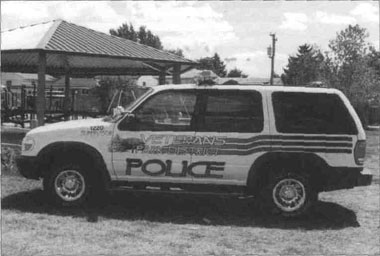|
S P E C I A L F O C U S
Keeping Park Police
in Top Form
Law enforcement agencies are under a magnifying
glass regarding training, supervision and policy
RICHARD A. HAAKE
A major challenge
to park policing
today is liability.
|
|
Community-oriented policing was in existence long before it became the law enforcement buzzword of the '90s. Its development probably dates back to the day when a "park ranger" asked a fisherman how the fishing was that day before he asked to check his fishing license.
|
Park policing has always emphasized a unique approach to policing that has just recently come to the forefront. Although credit is never given to the park law enforcement profession for the initiation of this approach, those of us in the field know the truth. While traditional policing may have borrowed an approach that has worked for park policing, it may be time for us to "borrow" traditional policing techniques that work for them.
A major challenge to park policing today is liability. Law enforcement departments are under a magnifying glass in regard to training,
supervision, and policy. Park policing — no matter if it is contracted out or managed as an agency division — cannot ignore what is happening in other police departments. Failure to train, failure to supervise, and inadequate or nonexistent policies for park law enforcement are all issues, which you can read about on any given day in the newspapers.
What can park law enforcement agencies do to combat these issues?
The answer is to examine what traditional law enforcement agencies are doing.

|
Training
To be a sworn officer in the state of Illinois you must attend a state-certified police academy. Unfortunately,
after graduation, very little ongoing training is mandated. Law changes, court decisions, case law,
and new laws occur daily. The average peace officer cannot possibly keep up with information disseminated in the newspapers, magazines, law enforcement publications or the Internet.
Police departments are developing annual training requirements for each officer. Agencies such as the Rockford Park District have developed an excellent in-house training program, which they open up to other park law enforcement agencies. The Fox Valley Park District contracts a portion of its training out to the Police Law Institute.
This training provides monthly computer updates as well as a test for each officer to take upon completion of the lesson. The Forest Preserve District of DuPage County's Law Enforcement Department utilizes North East Multi-Regional Training that provides unlimited training classes for $75 per officer per year. Other training units are available throughout the state.
|
Agencies that contract with local jurisdictions for law enforcement services may want to inquire about the type of training that their officers receive. For the amount of liability you assume as the contracting agency, you may want to find ways to reduce your liability.
November/December 2000 / 25
S P E C I A L F O C U S
Park law
enforcement
agencies need
to develop
training
programs,
create sound
policies, and
establish
relationships
with other park
law
enforcement
agencies.
|
|
Of the more than 18,000 police departments, only approximately 500 are accredited. Is the agency with which you contract police services accredited?
Accreditation for Law Enforcement Agencies
In '1979, the Commission on Accreditation for Law Enforcement Agencies (C.A.L.E.A.) was formed to establish law enforcement standards that hold true for police agencies regardless of your location, size or purpose. This voluntary process identifies up to 439 standards that have been nationally recognized, scrutinized and modified. Agencies accepted into the process are required to comply with 100 percent of the mandatory standards and 80 percent of the non-mandatory standards.
These standards identify what policies need to be in place, but leave the how you accomplish each standard up to each individual department. The whole process may take up to three years and may require the full-time efforts of anywhere between one to three staff for most of the three years. The Forest Preserve District of
DuPage County is in the final phase of this process and hopes to receive national accreditation status in July of 2001.
|
A new level of accreditation was recently formulated that allows police agencies to gradually work toward accreditation. This process results in a certification for the agency rather than accreditation. The major difference is that under certification, fewer standards are required. However, the standards required are the more critical policies such as Use of Force, Pursuits, and Arrests.
Accreditation or certification is a long process for most agencies. While the actual cost of the program is relatively small, the amount of staff time involved can be quite extensive. Illinois has an advantage in that an association was formed to help agencies involved in the accreditation process. The Illinois Police Accreditation Coalition meets monthly to discuss agency problems and concerns about complying with standards. When your agency decides it is ready to be assessed on the standards, the coalition will send out five association members that will conduct a mock assessment. Recommendations may be made to modify your existing policies to ensure compliance. Monthly meetings are moved around the state but most occur in the north and north central portions of the state due to the greater concentration of agencies going through the process.
|
Park Law Enforcement Associations
IPLEA
The Illinois Park Law Enforcement Association (IPLEA) was formed in 1981 with the following objectives:
• To heighten the awareness and support for the value of the park law enforcement professional;
• To develop training and educational opportunities for administrators, practitioners and educators;
• To promote research related to park law enforcement;
• To provide an avenue for the exchange of ideas between park professionals; and
• To provide services that contribute to the professional development of association members.
The association meets monthly to discuss current concerns, exchange ideas and develop a training program for the annual conference. A quarterly newsletter is mailed to all association members.
|
|
For More Information
Commission on Accreditation for Law Enforcement Agencies
1.800.368.3757
www.calea.com
North East Multi-Regional Training
630.896.8860
www.nemrt.com
Police Law Institute
1.800.554.5358
www.policelaw.org
Illinois Police Accreditation Coalition
www.ipac.org
Illinois Park Law Enforcement Association
President, Mark Johnson
630.264.7421
Park Law Enforcement Association
www.parkranger.corn
|
|
26 / Illinois Parks and Recreation
KEEPING PARK POLICE IN TOP FORM
PLEA
The Park Law Enforcement Association (PLEA) was formed prior to the Illinois Park Law Enforcement Association with the same objectives but its members come from all around the country. The association meets twice a year in different locations throughout the United States. A quarterly newsletter is mailed out to all members.
Park law enforcement agencies need to develop training programs, create sound policies, and establish relationships with other park law enforcement agencies.
All of the ideas presented here may not fit the needs of your particular agency. A full-blown accreditation will take a great deal of staff-time, and for some agencies, a great deal of money. However, becoming a member of
the Illinois Park Law Enforcement Association may only require two to four hours of an officer's time per month.
Each agency must determine its own needs. There are certainly police agencies out there that are not accredited, but their policy manual will stand with the best of them. The bottom line is that we have to keep abreast of what is transpiring outside park policing.
Training, involvement in associations, and policy development will help to ensure that your park law enforcement program continues to grow. •
RICHARD A. HAAKE
is the past president of the Illinois Park Law Enforcement Association and a lieutenant
with 19 years experience with the Forest Preserve District of DuPage County.
|
Veterans Park District Recognized for Its Police SUV
Veterans Park District's sports utility vehicle's design was selected for an Honorable Mention award in the 2000 Police Vehicle Design Contest sponsored by Law and Order magazine, the magazine for police management. Photographs of the winners were featured in the July 2000 issue of the magazine. More than 300 entries were received from nearly every state in the country and the United Kingdom and Canada.
Lt. Dennis Raschillo of Veterans Park District credited the district's executive director, Joseph R. Bronge, and the staff at Signco in Melrose Park for their collaborative efforts in designing a vehicle that would be unique and easily identifiable to residents.
|
"Considering the magnitude of thecompetition, the number of vehicles that entered nationally and internationally, we are
especially proud to have been chosen for the Honorable Mention award. The contest is important to all of us in law enforcement,
because the design of vehicles certainly increases our visibility and how residents perceive those who serve them," says Raschillo.
|

|
Over the past 12 years, more than 4,600 vehicles from around the world have participated in the contest. Judges are selected from the field of law enforcement and include police chiefs, automotive industry executives, sheriffs police and leaders in law enforcement associations.
-- Veteran's Park District
|
November/December 2000 / 27
|

